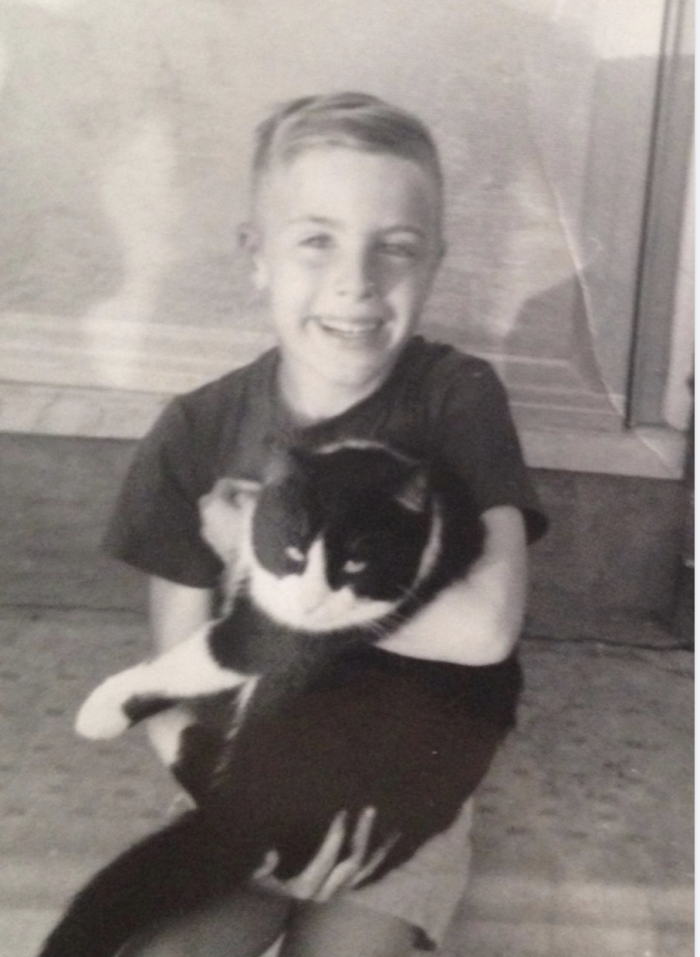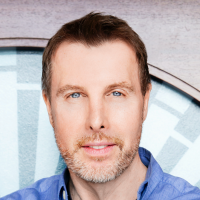This picture of me was taken over 50 years ago.
I wrote this on November 28, 2020, the eve of turning 60 years old. I was reminiscing about how this boy’s life has been run by anxiety.
“What progress, you ask, have I made? I have begun to be a friend to myself.” ~ Hecato
When I look back at my almost-60 years, I have become a medical doctor, neuroscientist, anxiety expert, yoga and meditation teacher, and a stand-up comedian. But none of those things made me feel like I was “enough,” mostly because I accomplished those things driven by that same fear of not being enough.
When fear is your motivator, it uses itself to keep you accomplishing. And for fear to keep its power, you can never feel like you are enough, so you never stop “accomplishing” or trying to “get ahead” (whatever that means).
I have a little protest inside myself when I consider a new task. Part of the protest is procrastination. My motto has been “never put off until tomorrow what you can put off until the day after that.” I didn’t start medical school until the latter part of my 20s, and I didn’t finish until I was in my 30s.
Fear and procrastination work together, and, personally, I have let anxiety and avoidance double-team me on more occasions than I would like to admit. I have often jokingly said my ADD has often canceled out my OCD—that my anxious obsession with accomplishment neutralizes my lack of focus. The OCD man drives the ADD boy, and neither is happy about it.
Until recently, no matter what I accomplished, it just wasn’t enough; my anxiety came back faster and faster after accomplishing a goal because many of the things I did were in an effort to escape anxiety. While the anxiety was there, I had to keep moving.
I know many so-called “anxiety experts” who say anxiety is a messenger—a gift. Well, I can honestly tell you that on the day before turning 60, my conscious, rational side accepts anxiety as a guiding and driving force in my life. Still, I often wonder how much I would have accomplished—how much more fulfilled I would feel—without the daily panic and self-doubt.
Although many people have said I am an accomplished person (again, whatever that means), I have the feeling I haven’t done what I wanted to do with my life, and I have squarely blamed anxiety for that perceived deficit. I became a medical doctor to help people, but also to assuage the feeling of not being heard.
I grew up in a family with chaos and emotional pain where my schizophrenic and bipolar father was almost always the center of attention. There were, of course, good times in my family, but my emotional (over)sensitivity always waited for my dad’s inevitable descent into madness. I could never fully let down my guard. I was always in motion, waiting for the other shoe to drop.
I have retained that characteristic hypervigilance as a familiar memento of my childhood and often gained respite from the overthinking through my ability to make people laugh. My career as a comedian started early on. I would often make my mother laugh during times of deep confusion and uncertainty.
I often used humor to connect with my classmates in school. Many times, as an adult physician faced with deep tragedy or uncertainty in one of my patients, I would crack morbid jokes in my head. Some jokes were really good, but you don’t want to laugh while telling someone they have herpes or shingles. The worst is informing someone that they got herpes on their shingles, as that’s a pain that’s hard to beat on planet Earth.
If you’ve never been beside a good friend who just hurt themselves by doing something stupid and you couldn’t laugh at their idiot-level misfortune, you’ll know what I mean. Humor became my way of coping while growing up with episodes of crushing pain and uncertainty.
As a result of using humor as a childlike coping strategy, I became a stand-up comic. From 2003-2014 I was a doctor by day, comedian by night. On stage as a comic, I found a place where I could be heard. But in my fear of being rejected, I wrote and performed things I thought would be funny to others, as opposed to talking about things that I really wanted to say. One of my biggest regrets is that I didn’t have the guts to talk about issues that really mattered to me in over a decade of doing spots in stand-up comedy venues two to three times a week.
There’s a reason why you don’t see too many physician-comedians, and I felt like I didn’t fit in either role because each was the opposite of the other in many ways. The doctors thought I was weird to be a stand-up comic, and the comics thought it was weird that I was a doctor. As a physician, I was trained to think in an extremely linear, analytical way, and that is the opposite mindset of what I needed to write comedy.
I also felt I had a responsibility to the medical profession to maintain that “doctor” image as an upstanding member of the community. Hence, both of those things got in the way of saying what I really wanted. As a comic, I also felt impotent and unheard, but this was self-inflicted, as I knew I wasn’t “speaking my truth” externally because of my internal fears, ironically, of not fitting in.
It is one of my biggest regrets to have done the hard work of taking years to (finally) be comfortable on stage and then blowing the opportunity by succumbing to the intoxication of making other people laugh over superficial things (think Jerry Seinfeld) as opposed to talking about the often morbid things that made me laugh (think Bill Burr).
Two or three years into stand up, I went through a “spiritual” phase; I became a yoga and meditation teacher. Yoga helped me with my anxiety, but I never felt confident as a yoga instructor. The predominant school of thought in yoga is much more ethereal and peaceful than my scientific training and childhood would allow, so I felt like a misfit there too.
I still practice yoga most days, and I find it exquisite for connecting to myself. However, often it is bittersweet as I often wonder if I should have continued teaching beyond the 18 months after my teacher training in 2007. I guess I could always go back someday, but just like stand-up, I probably won’t, mostly due to my own insecurities and fears.
On my parent’s anniversary this past October 2020, I did complete something that I finally felt totally authentic and congruent about, publishing my book on healing childhood trauma called Anxiety Rx. Out of all the things I have “accomplished,” the book feels the most authentically me.
Each one of those times when I felt like a misfit led me to a place where I could be heard and finally speak the truth of my life. In writing the book, I got to talk about the art and science of healing my anxiety from both ethereal and neuroscientific sources. Writing the book finally allowed me to hear myself, and my anxiety has decreased considerably since it was published.
Part of me, the child who never felt heard, wants millions of people to read it, but on the eve of turning 60, I know that it’s not the external validation that drives me so much as the internal satisfaction of finally being heard by myself.
Of course, I want the book to be successful, and I still fight with my compulsive childhood needs to be heard by as many people as possible, but there is a peace knowing I have created something that ultimately connects me to myself. As I say in the book, “All anxiety is separation anxiety—mostly separation from your own self.”
To heal from anxiety, you must connect with yourself and in the process of writing this book and going through my childhood wounds was integral to my reconnection. The part I didn’t expect came from hearing from people who shared that the book has allowed them to explore their own traumas and reconnect with themselves. Hearing those stories, I have come to know that I am not such a misfit after all. Through writing the book, I have come to see everything I have done “fits.”
As I have felt like a misfit for much of my life, I can now see how it all “fits” together.
I wish I could say I was looking forward to my 60s; that would be a convenient way of tying this all up. I’ve seen the light, I have gained wisdom, and now I can live in peace kind of thing? Well, that doesn’t fit with how I am feeling either. I know, and I see it is the boy in me who absolutely cannot stay on task and still feels like he isn’t heard. As I see him more and show him that I hear him, perhaps he won’t need to go looking for it in some new task or project.
Perhaps you feel like a misfit too? Perhaps you have a list of things you believe are counterproductive or inauthentic? But on the other hand, maybe those things needed to be done back then for you to have enough angst, so you are forced to hear, and connect with your younger self, now? Maybe the angst is there because you just haven’t learned the lesson of your life yet.
That’s okay. Maybe it all comes together when you’re 60?
I guess I’ll know that tomorrow.











Read 5 comments and reply